Leading Changes: An Executive Summary of Steve Jobs' Leadership
VerifiedAdded on 2020/09/17
|14
|3463
|30
Report
AI Summary
This report provides an executive summary and detailed analysis of Steve Jobs' leadership style, comparing it with traditional management approaches. It explores his innovative methods, his focus on innovation, and the impact of his leadership on Apple's organizational culture. The report discusses the differences between leaders and managers, highlighting Jobs' unique characteristics and his ability to predict the future. It examines his aggressive yet effective approach, his emphasis on teamwork, and the consequences of adopting his leadership skills. Furthermore, it includes discussions on theories and approaches related to management, innovation, and the role of human resources in the success of an organization. The report also covers the consequences of his leadership style, and the qualities that made him an effective leader.

LEADING CHANGES
Paraphrase This Document
Need a fresh take? Get an instant paraphrase of this document with our AI Paraphraser
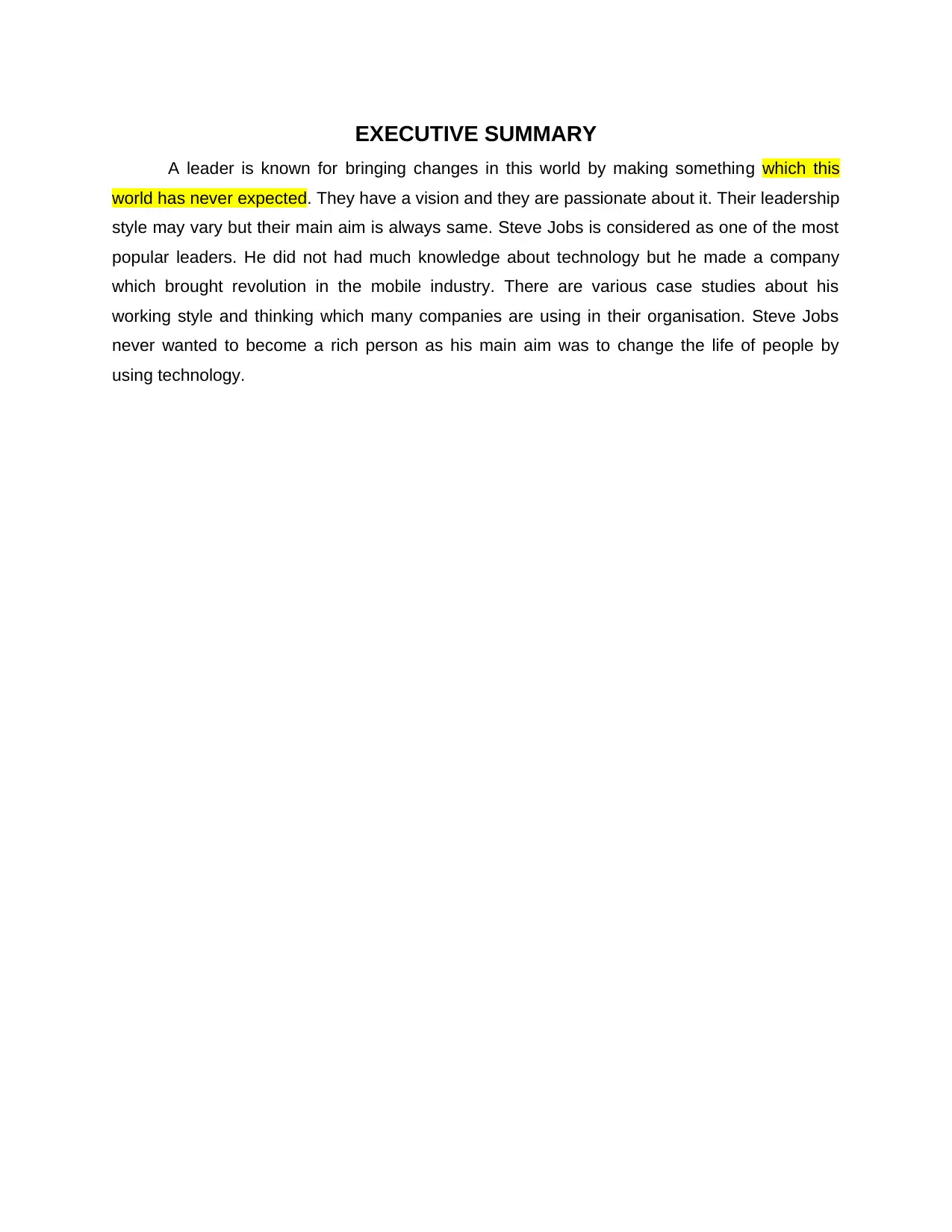
EXECUTIVE SUMMARY
A leader is known for bringing changes in this world by making something which this
world has never expected. They have a vision and they are passionate about it. Their leadership
style may vary but their main aim is always same. Steve Jobs is considered as one of the most
popular leaders. He did not had much knowledge about technology but he made a company
which brought revolution in the mobile industry. There are various case studies about his
working style and thinking which many companies are using in their organisation. Steve Jobs
never wanted to become a rich person as his main aim was to change the life of people by
using technology.
A leader is known for bringing changes in this world by making something which this
world has never expected. They have a vision and they are passionate about it. Their leadership
style may vary but their main aim is always same. Steve Jobs is considered as one of the most
popular leaders. He did not had much knowledge about technology but he made a company
which brought revolution in the mobile industry. There are various case studies about his
working style and thinking which many companies are using in their organisation. Steve Jobs
never wanted to become a rich person as his main aim was to change the life of people by
using technology.

TABLE OF CONTENTS
EXECUTIVE SUMMARY.............................................................................................................2
INTRODUCTION...........................................................................................................................1
DISCUSSION AND ANALYSIS..................................................................................................1
CONCLUSION...............................................................................................................................6
REFERENCES..............................................................................................................................8
APPENDIX...................................................................................................................................10
EXECUTIVE SUMMARY.............................................................................................................2
INTRODUCTION...........................................................................................................................1
DISCUSSION AND ANALYSIS..................................................................................................1
CONCLUSION...............................................................................................................................6
REFERENCES..............................................................................................................................8
APPENDIX...................................................................................................................................10
⊘ This is a preview!⊘
Do you want full access?
Subscribe today to unlock all pages.

Trusted by 1+ million students worldwide
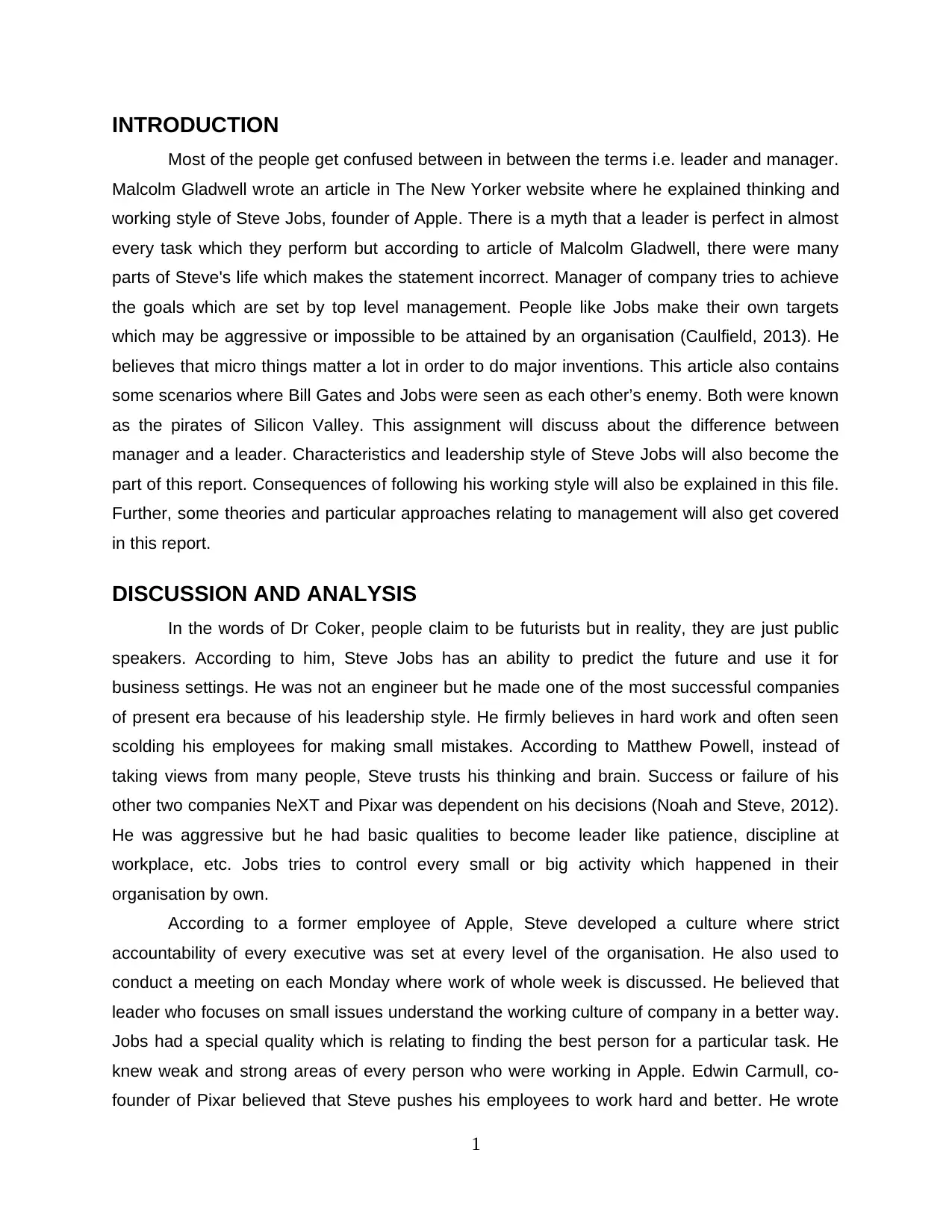
INTRODUCTION
Most of the people get confused between in between the terms i.e. leader and manager.
Malcolm Gladwell wrote an article in The New Yorker website where he explained thinking and
working style of Steve Jobs, founder of Apple. There is a myth that a leader is perfect in almost
every task which they perform but according to article of Malcolm Gladwell, there were many
parts of Steve's life which makes the statement incorrect. Manager of company tries to achieve
the goals which are set by top level management. People like Jobs make their own targets
which may be aggressive or impossible to be attained by an organisation (Caulfield, 2013). He
believes that micro things matter a lot in order to do major inventions. This article also contains
some scenarios where Bill Gates and Jobs were seen as each other’s enemy. Both were known
as the pirates of Silicon Valley. This assignment will discuss about the difference between
manager and a leader. Characteristics and leadership style of Steve Jobs will also become the
part of this report. Consequences of following his working style will also be explained in this file.
Further, some theories and particular approaches relating to management will also get covered
in this report.
DISCUSSION AND ANALYSIS
In the words of Dr Coker, people claim to be futurists but in reality, they are just public
speakers. According to him, Steve Jobs has an ability to predict the future and use it for
business settings. He was not an engineer but he made one of the most successful companies
of present era because of his leadership style. He firmly believes in hard work and often seen
scolding his employees for making small mistakes. According to Matthew Powell, instead of
taking views from many people, Steve trusts his thinking and brain. Success or failure of his
other two companies NeXT and Pixar was dependent on his decisions (Noah and Steve, 2012).
He was aggressive but he had basic qualities to become leader like patience, discipline at
workplace, etc. Jobs tries to control every small or big activity which happened in their
organisation by own.
According to a former employee of Apple, Steve developed a culture where strict
accountability of every executive was set at every level of the organisation. He also used to
conduct a meeting on each Monday where work of whole week is discussed. He believed that
leader who focuses on small issues understand the working culture of company in a better way.
Jobs had a special quality which is relating to finding the best person for a particular task. He
knew weak and strong areas of every person who were working in Apple. Edwin Carmull, co-
founder of Pixar believed that Steve pushes his employees to work hard and better. He wrote
1
Most of the people get confused between in between the terms i.e. leader and manager.
Malcolm Gladwell wrote an article in The New Yorker website where he explained thinking and
working style of Steve Jobs, founder of Apple. There is a myth that a leader is perfect in almost
every task which they perform but according to article of Malcolm Gladwell, there were many
parts of Steve's life which makes the statement incorrect. Manager of company tries to achieve
the goals which are set by top level management. People like Jobs make their own targets
which may be aggressive or impossible to be attained by an organisation (Caulfield, 2013). He
believes that micro things matter a lot in order to do major inventions. This article also contains
some scenarios where Bill Gates and Jobs were seen as each other’s enemy. Both were known
as the pirates of Silicon Valley. This assignment will discuss about the difference between
manager and a leader. Characteristics and leadership style of Steve Jobs will also become the
part of this report. Consequences of following his working style will also be explained in this file.
Further, some theories and particular approaches relating to management will also get covered
in this report.
DISCUSSION AND ANALYSIS
In the words of Dr Coker, people claim to be futurists but in reality, they are just public
speakers. According to him, Steve Jobs has an ability to predict the future and use it for
business settings. He was not an engineer but he made one of the most successful companies
of present era because of his leadership style. He firmly believes in hard work and often seen
scolding his employees for making small mistakes. According to Matthew Powell, instead of
taking views from many people, Steve trusts his thinking and brain. Success or failure of his
other two companies NeXT and Pixar was dependent on his decisions (Noah and Steve, 2012).
He was aggressive but he had basic qualities to become leader like patience, discipline at
workplace, etc. Jobs tries to control every small or big activity which happened in their
organisation by own.
According to a former employee of Apple, Steve developed a culture where strict
accountability of every executive was set at every level of the organisation. He also used to
conduct a meeting on each Monday where work of whole week is discussed. He believed that
leader who focuses on small issues understand the working culture of company in a better way.
Jobs had a special quality which is relating to finding the best person for a particular task. He
knew weak and strong areas of every person who were working in Apple. Edwin Carmull, co-
founder of Pixar believed that Steve pushes his employees to work hard and better. He wrote
1
Paraphrase This Document
Need a fresh take? Get an instant paraphrase of this document with our AI Paraphraser
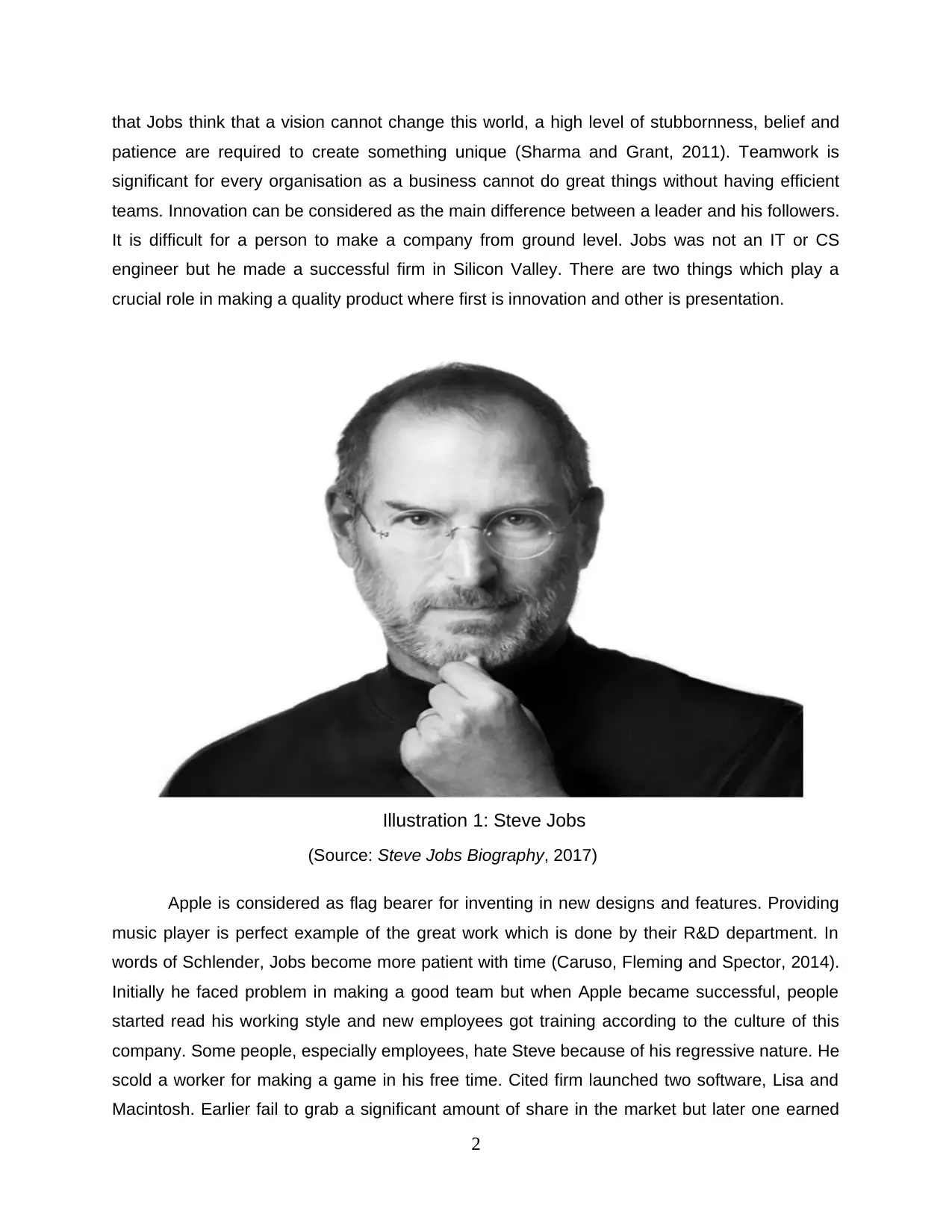
that Jobs think that a vision cannot change this world, a high level of stubbornness, belief and
patience are required to create something unique (Sharma and Grant, 2011). Teamwork is
significant for every organisation as a business cannot do great things without having efficient
teams. Innovation can be considered as the main difference between a leader and his followers.
It is difficult for a person to make a company from ground level. Jobs was not an IT or CS
engineer but he made a successful firm in Silicon Valley. There are two things which play a
crucial role in making a quality product where first is innovation and other is presentation.
(Source: Steve Jobs Biography, 2017)
Apple is considered as flag bearer for inventing in new designs and features. Providing
music player is perfect example of the great work which is done by their R&D department. In
words of Schlender, Jobs become more patient with time (Caruso, Fleming and Spector, 2014).
Initially he faced problem in making a good team but when Apple became successful, people
started read his working style and new employees got training according to the culture of this
company. Some people, especially employees, hate Steve because of his regressive nature. He
scold a worker for making a game in his free time. Cited firm launched two software, Lisa and
Macintosh. Earlier fail to grab a significant amount of share in the market but later one earned
2
Illustration 1: Steve Jobs
patience are required to create something unique (Sharma and Grant, 2011). Teamwork is
significant for every organisation as a business cannot do great things without having efficient
teams. Innovation can be considered as the main difference between a leader and his followers.
It is difficult for a person to make a company from ground level. Jobs was not an IT or CS
engineer but he made a successful firm in Silicon Valley. There are two things which play a
crucial role in making a quality product where first is innovation and other is presentation.
(Source: Steve Jobs Biography, 2017)
Apple is considered as flag bearer for inventing in new designs and features. Providing
music player is perfect example of the great work which is done by their R&D department. In
words of Schlender, Jobs become more patient with time (Caruso, Fleming and Spector, 2014).
Initially he faced problem in making a good team but when Apple became successful, people
started read his working style and new employees got training according to the culture of this
company. Some people, especially employees, hate Steve because of his regressive nature. He
scold a worker for making a game in his free time. Cited firm launched two software, Lisa and
Macintosh. Earlier fail to grab a significant amount of share in the market but later one earned
2
Illustration 1: Steve Jobs
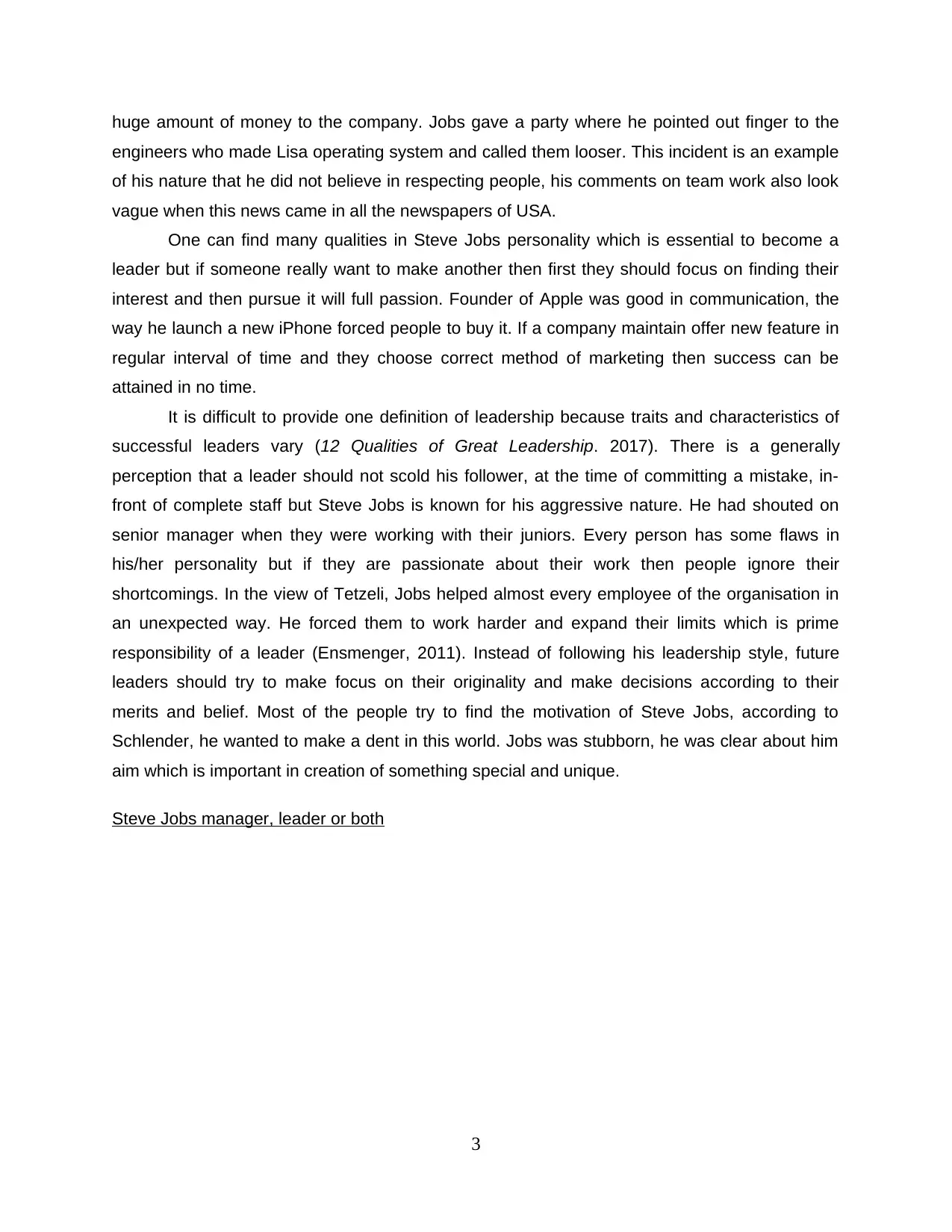
huge amount of money to the company. Jobs gave a party where he pointed out finger to the
engineers who made Lisa operating system and called them looser. This incident is an example
of his nature that he did not believe in respecting people, his comments on team work also look
vague when this news came in all the newspapers of USA.
One can find many qualities in Steve Jobs personality which is essential to become a
leader but if someone really want to make another then first they should focus on finding their
interest and then pursue it will full passion. Founder of Apple was good in communication, the
way he launch a new iPhone forced people to buy it. If a company maintain offer new feature in
regular interval of time and they choose correct method of marketing then success can be
attained in no time.
It is difficult to provide one definition of leadership because traits and characteristics of
successful leaders vary (12 Qualities of Great Leadership. 2017). There is a generally
perception that a leader should not scold his follower, at the time of committing a mistake, in-
front of complete staff but Steve Jobs is known for his aggressive nature. He had shouted on
senior manager when they were working with their juniors. Every person has some flaws in
his/her personality but if they are passionate about their work then people ignore their
shortcomings. In the view of Tetzeli, Jobs helped almost every employee of the organisation in
an unexpected way. He forced them to work harder and expand their limits which is prime
responsibility of a leader (Ensmenger, 2011). Instead of following his leadership style, future
leaders should try to make focus on their originality and make decisions according to their
merits and belief. Most of the people try to find the motivation of Steve Jobs, according to
Schlender, he wanted to make a dent in this world. Jobs was stubborn, he was clear about him
aim which is important in creation of something special and unique.
Steve Jobs manager, leader or both
3
engineers who made Lisa operating system and called them looser. This incident is an example
of his nature that he did not believe in respecting people, his comments on team work also look
vague when this news came in all the newspapers of USA.
One can find many qualities in Steve Jobs personality which is essential to become a
leader but if someone really want to make another then first they should focus on finding their
interest and then pursue it will full passion. Founder of Apple was good in communication, the
way he launch a new iPhone forced people to buy it. If a company maintain offer new feature in
regular interval of time and they choose correct method of marketing then success can be
attained in no time.
It is difficult to provide one definition of leadership because traits and characteristics of
successful leaders vary (12 Qualities of Great Leadership. 2017). There is a generally
perception that a leader should not scold his follower, at the time of committing a mistake, in-
front of complete staff but Steve Jobs is known for his aggressive nature. He had shouted on
senior manager when they were working with their juniors. Every person has some flaws in
his/her personality but if they are passionate about their work then people ignore their
shortcomings. In the view of Tetzeli, Jobs helped almost every employee of the organisation in
an unexpected way. He forced them to work harder and expand their limits which is prime
responsibility of a leader (Ensmenger, 2011). Instead of following his leadership style, future
leaders should try to make focus on their originality and make decisions according to their
merits and belief. Most of the people try to find the motivation of Steve Jobs, according to
Schlender, he wanted to make a dent in this world. Jobs was stubborn, he was clear about him
aim which is important in creation of something special and unique.
Steve Jobs manager, leader or both
3
⊘ This is a preview!⊘
Do you want full access?
Subscribe today to unlock all pages.

Trusted by 1+ million students worldwide
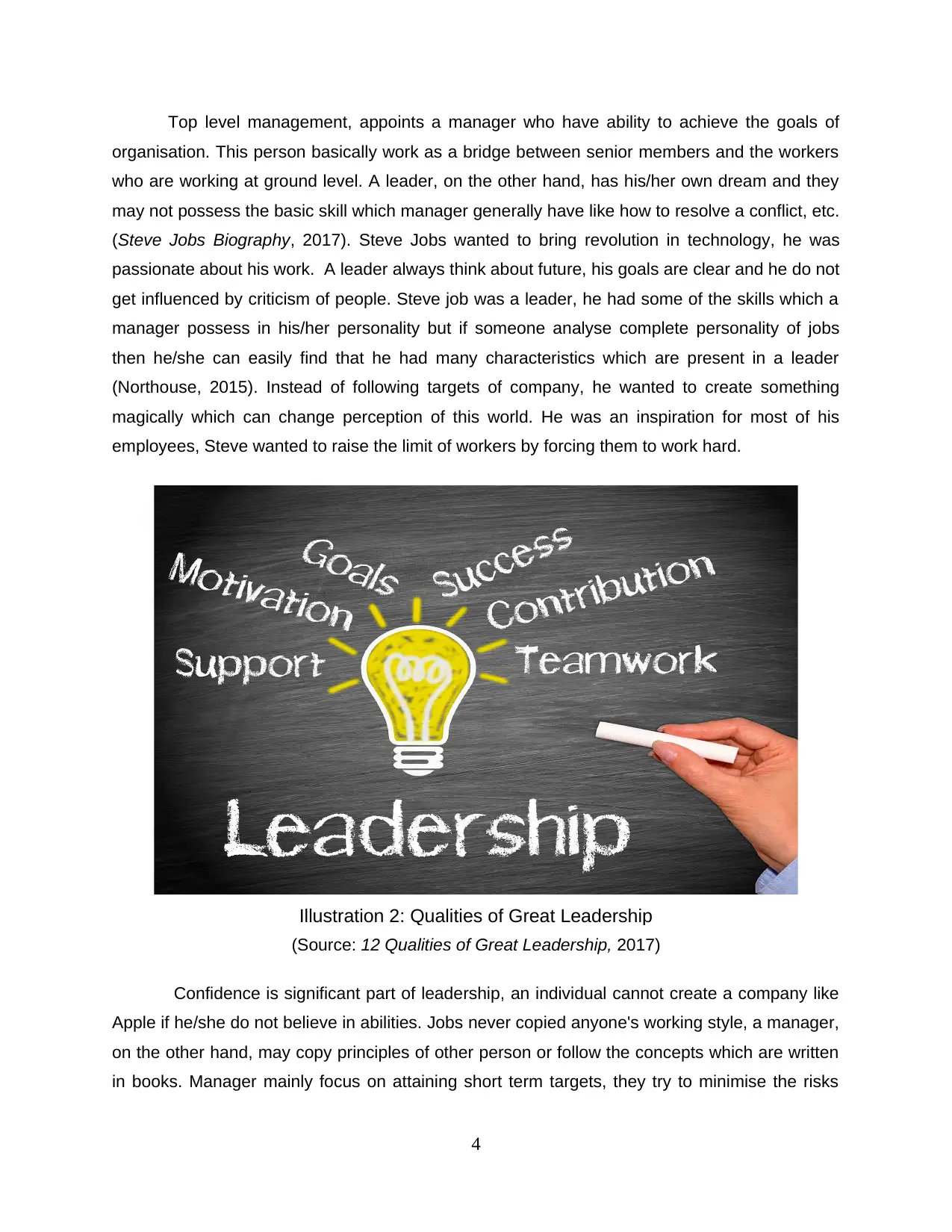
Top level management, appoints a manager who have ability to achieve the goals of
organisation. This person basically work as a bridge between senior members and the workers
who are working at ground level. A leader, on the other hand, has his/her own dream and they
may not possess the basic skill which manager generally have like how to resolve a conflict, etc.
(Steve Jobs Biography, 2017). Steve Jobs wanted to bring revolution in technology, he was
passionate about his work. A leader always think about future, his goals are clear and he do not
get influenced by criticism of people. Steve job was a leader, he had some of the skills which a
manager possess in his/her personality but if someone analyse complete personality of jobs
then he/she can easily find that he had many characteristics which are present in a leader
(Northouse, 2015). Instead of following targets of company, he wanted to create something
magically which can change perception of this world. He was an inspiration for most of his
employees, Steve wanted to raise the limit of workers by forcing them to work hard.
(Source: 12 Qualities of Great Leadership, 2017)
Confidence is significant part of leadership, an individual cannot create a company like
Apple if he/she do not believe in abilities. Jobs never copied anyone's working style, a manager,
on the other hand, may copy principles of other person or follow the concepts which are written
in books. Manager mainly focus on attaining short term targets, they try to minimise the risks
4
Illustration 2: Qualities of Great Leadership
organisation. This person basically work as a bridge between senior members and the workers
who are working at ground level. A leader, on the other hand, has his/her own dream and they
may not possess the basic skill which manager generally have like how to resolve a conflict, etc.
(Steve Jobs Biography, 2017). Steve Jobs wanted to bring revolution in technology, he was
passionate about his work. A leader always think about future, his goals are clear and he do not
get influenced by criticism of people. Steve job was a leader, he had some of the skills which a
manager possess in his/her personality but if someone analyse complete personality of jobs
then he/she can easily find that he had many characteristics which are present in a leader
(Northouse, 2015). Instead of following targets of company, he wanted to create something
magically which can change perception of this world. He was an inspiration for most of his
employees, Steve wanted to raise the limit of workers by forcing them to work hard.
(Source: 12 Qualities of Great Leadership, 2017)
Confidence is significant part of leadership, an individual cannot create a company like
Apple if he/she do not believe in abilities. Jobs never copied anyone's working style, a manager,
on the other hand, may copy principles of other person or follow the concepts which are written
in books. Manager mainly focus on attaining short term targets, they try to minimise the risks
4
Illustration 2: Qualities of Great Leadership
Paraphrase This Document
Need a fresh take? Get an instant paraphrase of this document with our AI Paraphraser
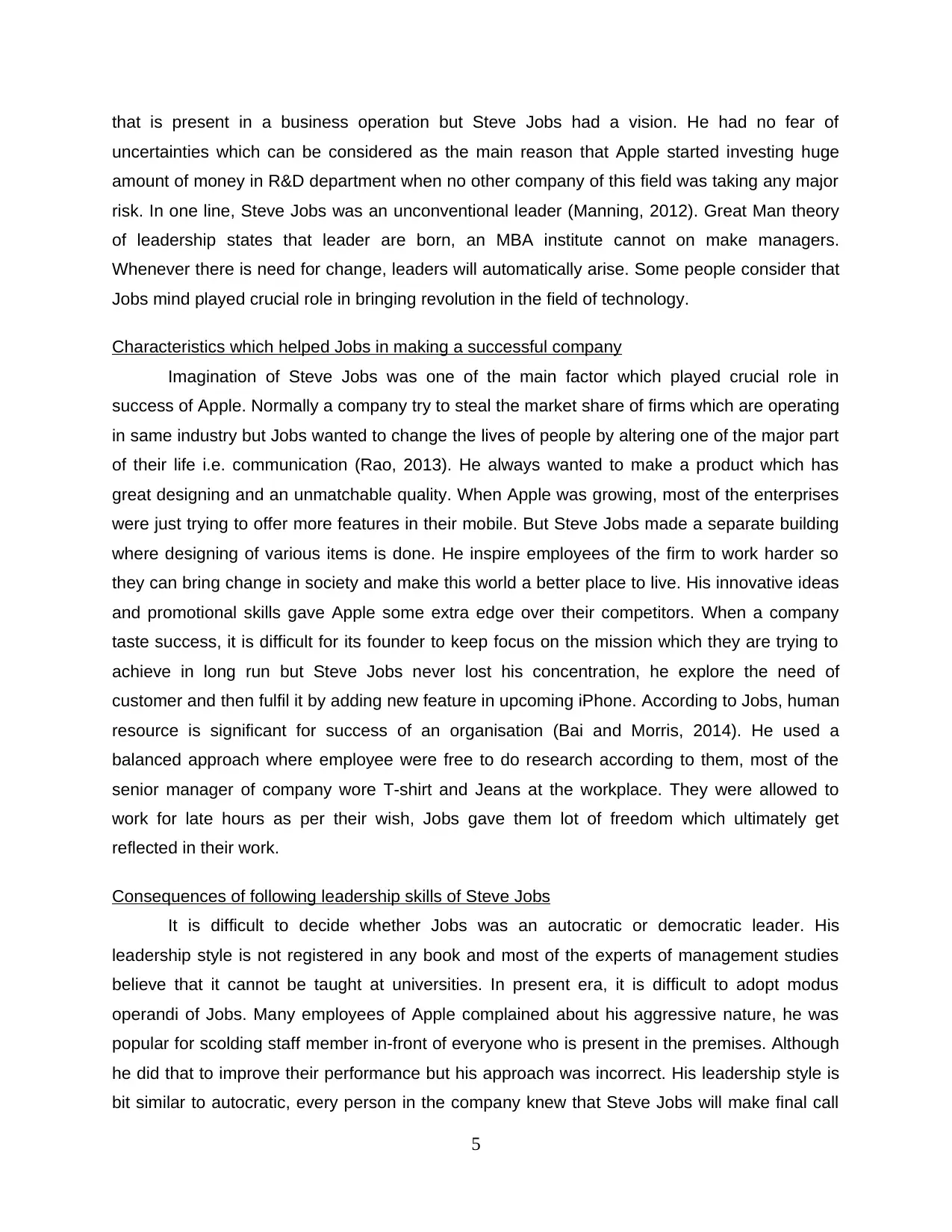
that is present in a business operation but Steve Jobs had a vision. He had no fear of
uncertainties which can be considered as the main reason that Apple started investing huge
amount of money in R&D department when no other company of this field was taking any major
risk. In one line, Steve Jobs was an unconventional leader (Manning, 2012). Great Man theory
of leadership states that leader are born, an MBA institute cannot on make managers.
Whenever there is need for change, leaders will automatically arise. Some people consider that
Jobs mind played crucial role in bringing revolution in the field of technology.
Characteristics which helped Jobs in making a successful company
Imagination of Steve Jobs was one of the main factor which played crucial role in
success of Apple. Normally a company try to steal the market share of firms which are operating
in same industry but Jobs wanted to change the lives of people by altering one of the major part
of their life i.e. communication (Rao, 2013). He always wanted to make a product which has
great designing and an unmatchable quality. When Apple was growing, most of the enterprises
were just trying to offer more features in their mobile. But Steve Jobs made a separate building
where designing of various items is done. He inspire employees of the firm to work harder so
they can bring change in society and make this world a better place to live. His innovative ideas
and promotional skills gave Apple some extra edge over their competitors. When a company
taste success, it is difficult for its founder to keep focus on the mission which they are trying to
achieve in long run but Steve Jobs never lost his concentration, he explore the need of
customer and then fulfil it by adding new feature in upcoming iPhone. According to Jobs, human
resource is significant for success of an organisation (Bai and Morris, 2014). He used a
balanced approach where employee were free to do research according to them, most of the
senior manager of company wore T-shirt and Jeans at the workplace. They were allowed to
work for late hours as per their wish, Jobs gave them lot of freedom which ultimately get
reflected in their work.
Consequences of following leadership skills of Steve Jobs
It is difficult to decide whether Jobs was an autocratic or democratic leader. His
leadership style is not registered in any book and most of the experts of management studies
believe that it cannot be taught at universities. In present era, it is difficult to adopt modus
operandi of Jobs. Many employees of Apple complained about his aggressive nature, he was
popular for scolding staff member in-front of everyone who is present in the premises. Although
he did that to improve their performance but his approach was incorrect. His leadership style is
bit similar to autocratic, every person in the company knew that Steve Jobs will make final call
5
uncertainties which can be considered as the main reason that Apple started investing huge
amount of money in R&D department when no other company of this field was taking any major
risk. In one line, Steve Jobs was an unconventional leader (Manning, 2012). Great Man theory
of leadership states that leader are born, an MBA institute cannot on make managers.
Whenever there is need for change, leaders will automatically arise. Some people consider that
Jobs mind played crucial role in bringing revolution in the field of technology.
Characteristics which helped Jobs in making a successful company
Imagination of Steve Jobs was one of the main factor which played crucial role in
success of Apple. Normally a company try to steal the market share of firms which are operating
in same industry but Jobs wanted to change the lives of people by altering one of the major part
of their life i.e. communication (Rao, 2013). He always wanted to make a product which has
great designing and an unmatchable quality. When Apple was growing, most of the enterprises
were just trying to offer more features in their mobile. But Steve Jobs made a separate building
where designing of various items is done. He inspire employees of the firm to work harder so
they can bring change in society and make this world a better place to live. His innovative ideas
and promotional skills gave Apple some extra edge over their competitors. When a company
taste success, it is difficult for its founder to keep focus on the mission which they are trying to
achieve in long run but Steve Jobs never lost his concentration, he explore the need of
customer and then fulfil it by adding new feature in upcoming iPhone. According to Jobs, human
resource is significant for success of an organisation (Bai and Morris, 2014). He used a
balanced approach where employee were free to do research according to them, most of the
senior manager of company wore T-shirt and Jeans at the workplace. They were allowed to
work for late hours as per their wish, Jobs gave them lot of freedom which ultimately get
reflected in their work.
Consequences of following leadership skills of Steve Jobs
It is difficult to decide whether Jobs was an autocratic or democratic leader. His
leadership style is not registered in any book and most of the experts of management studies
believe that it cannot be taught at universities. In present era, it is difficult to adopt modus
operandi of Jobs. Many employees of Apple complained about his aggressive nature, he was
popular for scolding staff member in-front of everyone who is present in the premises. Although
he did that to improve their performance but his approach was incorrect. His leadership style is
bit similar to autocratic, every person in the company knew that Steve Jobs will make final call
5
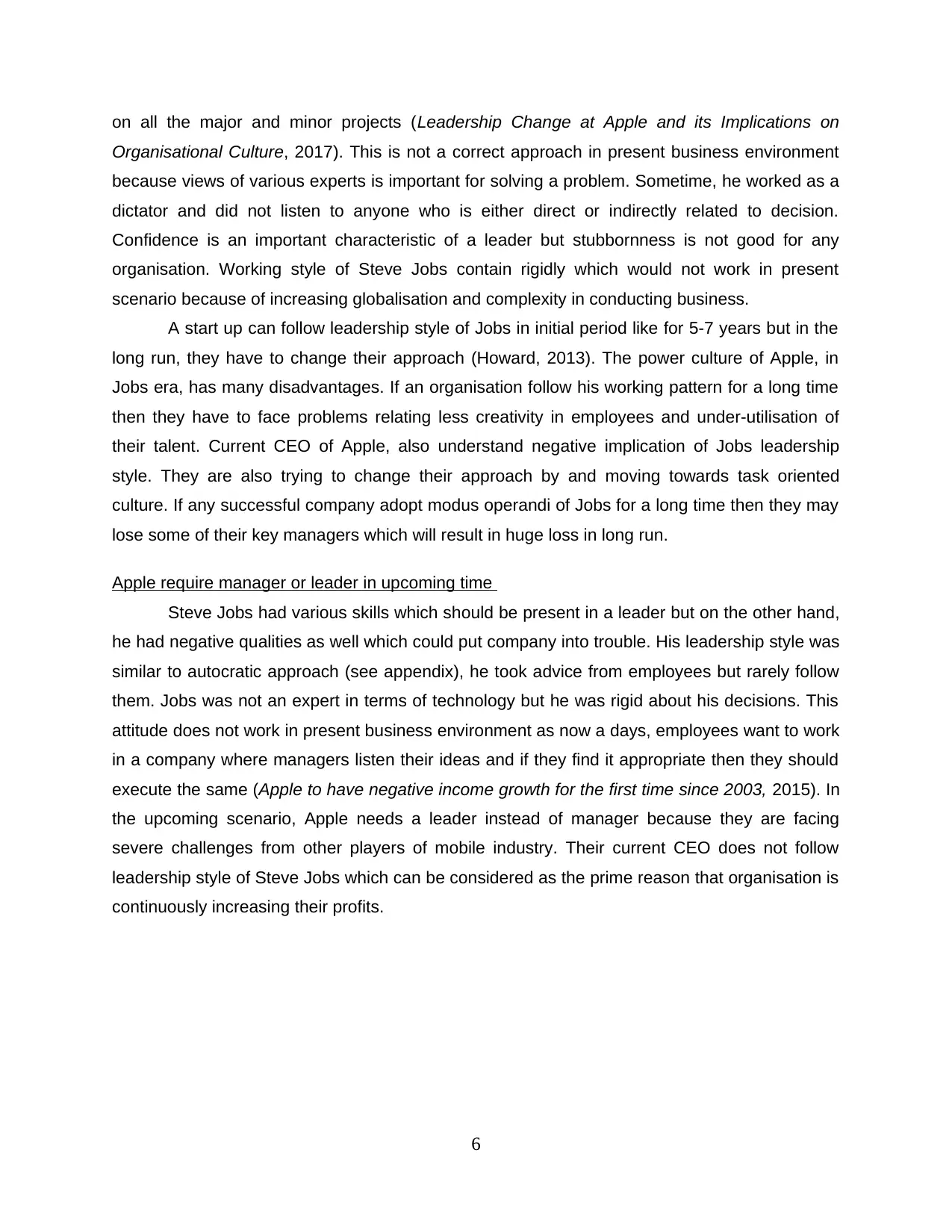
on all the major and minor projects (Leadership Change at Apple and its Implications on
Organisational Culture, 2017). This is not a correct approach in present business environment
because views of various experts is important for solving a problem. Sometime, he worked as a
dictator and did not listen to anyone who is either direct or indirectly related to decision.
Confidence is an important characteristic of a leader but stubbornness is not good for any
organisation. Working style of Steve Jobs contain rigidly which would not work in present
scenario because of increasing globalisation and complexity in conducting business.
A start up can follow leadership style of Jobs in initial period like for 5-7 years but in the
long run, they have to change their approach (Howard, 2013). The power culture of Apple, in
Jobs era, has many disadvantages. If an organisation follow his working pattern for a long time
then they have to face problems relating less creativity in employees and under-utilisation of
their talent. Current CEO of Apple, also understand negative implication of Jobs leadership
style. They are also trying to change their approach by and moving towards task oriented
culture. If any successful company adopt modus operandi of Jobs for a long time then they may
lose some of their key managers which will result in huge loss in long run.
Apple require manager or leader in upcoming time
Steve Jobs had various skills which should be present in a leader but on the other hand,
he had negative qualities as well which could put company into trouble. His leadership style was
similar to autocratic approach (see appendix), he took advice from employees but rarely follow
them. Jobs was not an expert in terms of technology but he was rigid about his decisions. This
attitude does not work in present business environment as now a days, employees want to work
in a company where managers listen their ideas and if they find it appropriate then they should
execute the same (Apple to have negative income growth for the first time since 2003, 2015). In
the upcoming scenario, Apple needs a leader instead of manager because they are facing
severe challenges from other players of mobile industry. Their current CEO does not follow
leadership style of Steve Jobs which can be considered as the prime reason that organisation is
continuously increasing their profits.
6
Organisational Culture, 2017). This is not a correct approach in present business environment
because views of various experts is important for solving a problem. Sometime, he worked as a
dictator and did not listen to anyone who is either direct or indirectly related to decision.
Confidence is an important characteristic of a leader but stubbornness is not good for any
organisation. Working style of Steve Jobs contain rigidly which would not work in present
scenario because of increasing globalisation and complexity in conducting business.
A start up can follow leadership style of Jobs in initial period like for 5-7 years but in the
long run, they have to change their approach (Howard, 2013). The power culture of Apple, in
Jobs era, has many disadvantages. If an organisation follow his working pattern for a long time
then they have to face problems relating less creativity in employees and under-utilisation of
their talent. Current CEO of Apple, also understand negative implication of Jobs leadership
style. They are also trying to change their approach by and moving towards task oriented
culture. If any successful company adopt modus operandi of Jobs for a long time then they may
lose some of their key managers which will result in huge loss in long run.
Apple require manager or leader in upcoming time
Steve Jobs had various skills which should be present in a leader but on the other hand,
he had negative qualities as well which could put company into trouble. His leadership style was
similar to autocratic approach (see appendix), he took advice from employees but rarely follow
them. Jobs was not an expert in terms of technology but he was rigid about his decisions. This
attitude does not work in present business environment as now a days, employees want to work
in a company where managers listen their ideas and if they find it appropriate then they should
execute the same (Apple to have negative income growth for the first time since 2003, 2015). In
the upcoming scenario, Apple needs a leader instead of manager because they are facing
severe challenges from other players of mobile industry. Their current CEO does not follow
leadership style of Steve Jobs which can be considered as the prime reason that organisation is
continuously increasing their profits.
6
⊘ This is a preview!⊘
Do you want full access?
Subscribe today to unlock all pages.

Trusted by 1+ million students worldwide
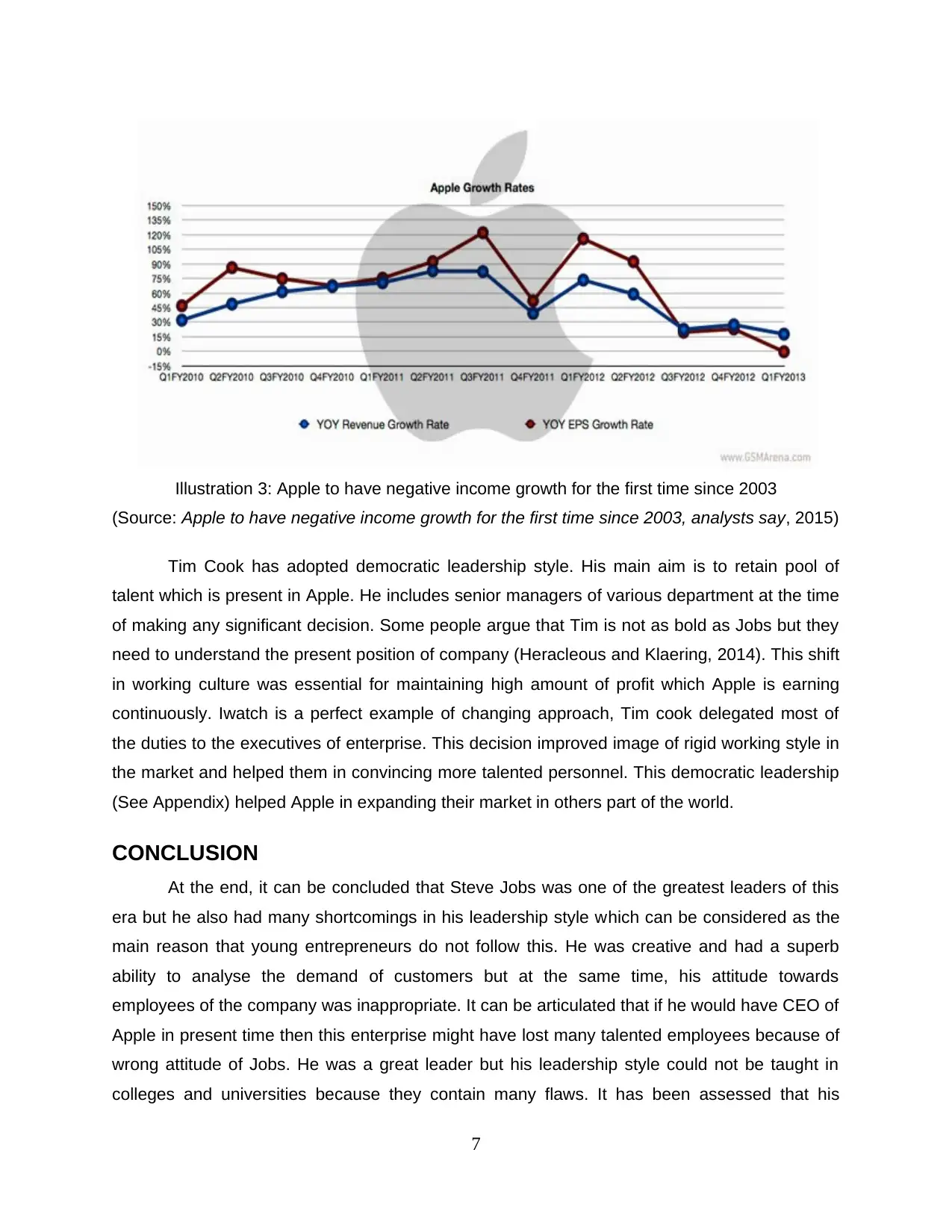
(Source: Apple to have negative income growth for the first time since 2003, analysts say, 2015)
Tim Cook has adopted democratic leadership style. His main aim is to retain pool of
talent which is present in Apple. He includes senior managers of various department at the time
of making any significant decision. Some people argue that Tim is not as bold as Jobs but they
need to understand the present position of company (Heracleous and Klaering, 2014). This shift
in working culture was essential for maintaining high amount of profit which Apple is earning
continuously. Iwatch is a perfect example of changing approach, Tim cook delegated most of
the duties to the executives of enterprise. This decision improved image of rigid working style in
the market and helped them in convincing more talented personnel. This democratic leadership
(See Appendix) helped Apple in expanding their market in others part of the world.
CONCLUSION
At the end, it can be concluded that Steve Jobs was one of the greatest leaders of this
era but he also had many shortcomings in his leadership style which can be considered as the
main reason that young entrepreneurs do not follow this. He was creative and had a superb
ability to analyse the demand of customers but at the same time, his attitude towards
employees of the company was inappropriate. It can be articulated that if he would have CEO of
Apple in present time then this enterprise might have lost many talented employees because of
wrong attitude of Jobs. He was a great leader but his leadership style could not be taught in
colleges and universities because they contain many flaws. It has been assessed that his
7
Illustration 3: Apple to have negative income growth for the first time since 2003
Tim Cook has adopted democratic leadership style. His main aim is to retain pool of
talent which is present in Apple. He includes senior managers of various department at the time
of making any significant decision. Some people argue that Tim is not as bold as Jobs but they
need to understand the present position of company (Heracleous and Klaering, 2014). This shift
in working culture was essential for maintaining high amount of profit which Apple is earning
continuously. Iwatch is a perfect example of changing approach, Tim cook delegated most of
the duties to the executives of enterprise. This decision improved image of rigid working style in
the market and helped them in convincing more talented personnel. This democratic leadership
(See Appendix) helped Apple in expanding their market in others part of the world.
CONCLUSION
At the end, it can be concluded that Steve Jobs was one of the greatest leaders of this
era but he also had many shortcomings in his leadership style which can be considered as the
main reason that young entrepreneurs do not follow this. He was creative and had a superb
ability to analyse the demand of customers but at the same time, his attitude towards
employees of the company was inappropriate. It can be articulated that if he would have CEO of
Apple in present time then this enterprise might have lost many talented employees because of
wrong attitude of Jobs. He was a great leader but his leadership style could not be taught in
colleges and universities because they contain many flaws. It has been assessed that his
7
Illustration 3: Apple to have negative income growth for the first time since 2003
Paraphrase This Document
Need a fresh take? Get an instant paraphrase of this document with our AI Paraphraser

successor, Tim Cook, has done remarkable work in last 5-7 years. He has adopted democratic
leadership style because he understood that attitude of Jobs would not work for Apple in long
run.
8
leadership style because he understood that attitude of Jobs would not work for Apple in long
run.
8
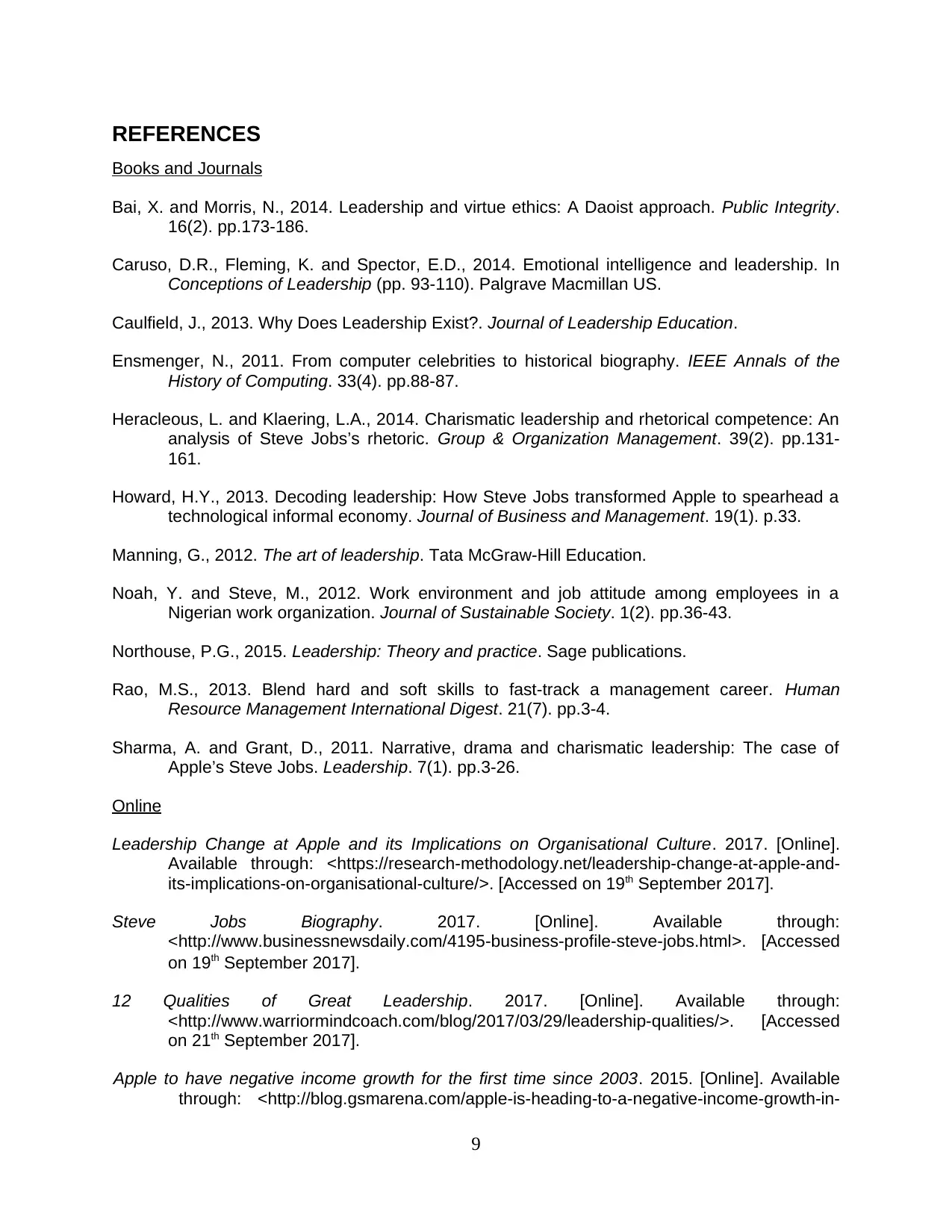
REFERENCES
Books and Journals
Bai, X. and Morris, N., 2014. Leadership and virtue ethics: A Daoist approach. Public Integrity.
16(2). pp.173-186.
Caruso, D.R., Fleming, K. and Spector, E.D., 2014. Emotional intelligence and leadership. In
Conceptions of Leadership (pp. 93-110). Palgrave Macmillan US.
Caulfield, J., 2013. Why Does Leadership Exist?. Journal of Leadership Education.
Ensmenger, N., 2011. From computer celebrities to historical biography. IEEE Annals of the
History of Computing. 33(4). pp.88-87.
Heracleous, L. and Klaering, L.A., 2014. Charismatic leadership and rhetorical competence: An
analysis of Steve Jobs’s rhetoric. Group & Organization Management. 39(2). pp.131-
161.
Howard, H.Y., 2013. Decoding leadership: How Steve Jobs transformed Apple to spearhead a
technological informal economy. Journal of Business and Management. 19(1). p.33.
Manning, G., 2012. The art of leadership. Tata McGraw-Hill Education.
Noah, Y. and Steve, M., 2012. Work environment and job attitude among employees in a
Nigerian work organization. Journal of Sustainable Society. 1(2). pp.36-43.
Northouse, P.G., 2015. Leadership: Theory and practice. Sage publications.
Rao, M.S., 2013. Blend hard and soft skills to fast-track a management career. Human
Resource Management International Digest. 21(7). pp.3-4.
Sharma, A. and Grant, D., 2011. Narrative, drama and charismatic leadership: The case of
Apple’s Steve Jobs. Leadership. 7(1). pp.3-26.
Online
Leadership Change at Apple and its Implications on Organisational Culture. 2017. [Online].
Available through: <https://research-methodology.net/leadership-change-at-apple-and-
its-implications-on-organisational-culture/>. [Accessed on 19th September 2017].
Steve Jobs Biography. 2017. [Online]. Available through:
<http://www.businessnewsdaily.com/4195-business-profile-steve-jobs.html>. [Accessed
on 19th September 2017].
12 Qualities of Great Leadership. 2017. [Online]. Available through:
<http://www.warriormindcoach.com/blog/2017/03/29/leadership-qualities/>. [Accessed
on 21th September 2017].
Apple to have negative income growth for the first time since 2003. 2015. [Online]. Available
through: <http://blog.gsmarena.com/apple-is-heading-to-a-negative-income-growth-in-
9
Books and Journals
Bai, X. and Morris, N., 2014. Leadership and virtue ethics: A Daoist approach. Public Integrity.
16(2). pp.173-186.
Caruso, D.R., Fleming, K. and Spector, E.D., 2014. Emotional intelligence and leadership. In
Conceptions of Leadership (pp. 93-110). Palgrave Macmillan US.
Caulfield, J., 2013. Why Does Leadership Exist?. Journal of Leadership Education.
Ensmenger, N., 2011. From computer celebrities to historical biography. IEEE Annals of the
History of Computing. 33(4). pp.88-87.
Heracleous, L. and Klaering, L.A., 2014. Charismatic leadership and rhetorical competence: An
analysis of Steve Jobs’s rhetoric. Group & Organization Management. 39(2). pp.131-
161.
Howard, H.Y., 2013. Decoding leadership: How Steve Jobs transformed Apple to spearhead a
technological informal economy. Journal of Business and Management. 19(1). p.33.
Manning, G., 2012. The art of leadership. Tata McGraw-Hill Education.
Noah, Y. and Steve, M., 2012. Work environment and job attitude among employees in a
Nigerian work organization. Journal of Sustainable Society. 1(2). pp.36-43.
Northouse, P.G., 2015. Leadership: Theory and practice. Sage publications.
Rao, M.S., 2013. Blend hard and soft skills to fast-track a management career. Human
Resource Management International Digest. 21(7). pp.3-4.
Sharma, A. and Grant, D., 2011. Narrative, drama and charismatic leadership: The case of
Apple’s Steve Jobs. Leadership. 7(1). pp.3-26.
Online
Leadership Change at Apple and its Implications on Organisational Culture. 2017. [Online].
Available through: <https://research-methodology.net/leadership-change-at-apple-and-
its-implications-on-organisational-culture/>. [Accessed on 19th September 2017].
Steve Jobs Biography. 2017. [Online]. Available through:
<http://www.businessnewsdaily.com/4195-business-profile-steve-jobs.html>. [Accessed
on 19th September 2017].
12 Qualities of Great Leadership. 2017. [Online]. Available through:
<http://www.warriormindcoach.com/blog/2017/03/29/leadership-qualities/>. [Accessed
on 21th September 2017].
Apple to have negative income growth for the first time since 2003. 2015. [Online]. Available
through: <http://blog.gsmarena.com/apple-is-heading-to-a-negative-income-growth-in-
9
⊘ This is a preview!⊘
Do you want full access?
Subscribe today to unlock all pages.

Trusted by 1+ million students worldwide
1 out of 14
Related Documents
Your All-in-One AI-Powered Toolkit for Academic Success.
+13062052269
info@desklib.com
Available 24*7 on WhatsApp / Email
![[object Object]](/_next/static/media/star-bottom.7253800d.svg)
Unlock your academic potential
Copyright © 2020–2026 A2Z Services. All Rights Reserved. Developed and managed by ZUCOL.




